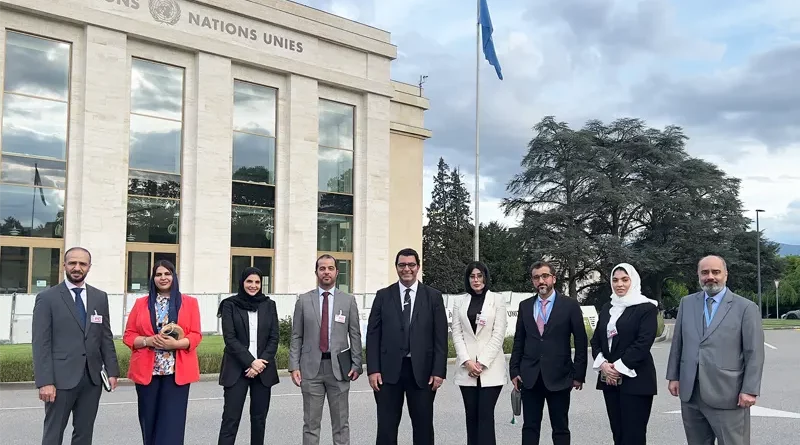National Human Rights Institution participates as ‘Observer’ in UPR
GENEVA: The National Human Rights Institution (NHRI) delegation headed by Maqsoud Kruse, Chairperson of the NHRI, has participated as an “Observer” at the 43rd session of the Universal Periodic Review (UPR), which took place at the United Nations Office in Geneva on Monday, to discuss the fourth national report on the UAE.
The delegation included Fatima Al Kaabi, Deputy Chairperson; Mohamed Al Hammadi, Head of the Civil and Political Rights Committee; Maryam Al Ahmadi, Head of the International Relations and Non-Governmental Organisations Committee; Ameirah Al Seraidi, Head of the Economic, Social, Cultural and Environmental Rights Committee; Fatma Al Bedwawi, Head of the Complaints, Monitoring and Field Visits Committee Board Member; Dr. Ahmed Al Mansoori, Head of the Promotion of Human Rights Culture Committee; Dr. Zayed Al Shamsi, Head of the Legal and Legislative Affairs Committee; in addition to Dr. Saeed Al Ghfeli, the Secretary-General of the NHRI; and Fajr Al Haidan, Head of the Executive Affairs Section at the Chairperson Office.
Commenting on the Institution’s participation as an observer, Kruse said, “We look forward to receiving the recommendations from the Universal Periodic Review on the Fourth Report on the United Arab Emirates.
“We commend praising the establishment of the NHRI in the UAE as an independent Institution based on the Paris Principles and its important role in enhancing and protecting human rights that were mentioned by several countries during the sessions.”
The Universal Periodic Review is a unique mechanism created in 2006 by the United Nations Human Rights Council to review and improve the human rights situation in all United Nations member states.
The Universal Periodic Review (UPR) process includes reviewing documents and reports submitted by the concerned state and the participation of non-governmental organisations, private sector institutions and regional organisations. Other member states provide recommendations for improving the human rights situation in the reviewed country, and the concerned state submits an action plan to implement the agreed-upon recommendations, including identifying the resources and efforts necessary to implement the recommendations.
This makes the UPR an essential mechanism for international cooperation and sustainable dialogue on human rights and related developments.
National human rights institutions (NHRI’s) play a significant role in the Universal Periodic Review process, as they participate in various stages of the process as independent and reliable entities to promote and protect human rights at the national level.
They also prepare independent reports on human rights in their countries, provide information and recommendations, participate in review sessions, monitor the implementation of adopted recommendations, raise awareness and highlight the importance of the UPR.

